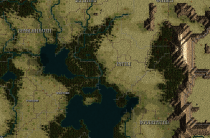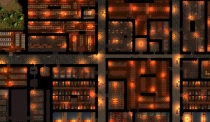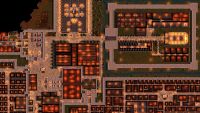Settlement



Settlements are the core component of the game Songs of Syx. The sole purpose of the game is to properly manage one. A settlement is a community made up of citizens, constructed buildings, collected resources, an established workforce, economic trading, defenses and law. The world and regions of the game is made up of many connecting settlements, but the player gets an entire settlement to oneself; one that starts from scratch, must be properly managed to the point where it should constantly grow and must always be improved and made as self-sufficient as possible. As the population grows, the player accesses new status levels that unlock new bonuses and buildings.
When a new game is started, the player must choose a location for the settlement. Each location provides differing levels of natural resources and climates. These elements dictate many factors about your settlement, as well as enable or disable certain agricultural buildings. Each climate provides a small bonus to farming, fishing and hunting; depending on which climate is chosen. The player should carefully choose an area that best suits their playstyle.
With enough effort and time taken to understand the game's mechanics, a settlement can turn into a city, and that city can turn into a massive empire that would have other settlements either cower in fear, marvel in awe or potentially both. Settlements can be improved by constructing an administration building, and having the citizens working there to accumulate admin points, which can then be used to upgrade and better manage the player's settlement.
Each settlement has a flag, with the player's settlement's flag being fully customizable.
Citizens
- Main article: Citizens
The citizens are the lifeblood of any settlement. Without them, your settlement would be vast, empty acres of land without purpose. Citizens come in three races: Cretonians, Dondorians and Cantors. They provide different personality types, strengths and weaknesses depending on their race. To get the most out of citizens, the player should allocate them properly, using their strengths to one's advantage. Citizens are responsible for getting all things done in your settlement, from making farms to constructing buildings; from tending to livestock to managing balanced trades to acquire helpful resources.
In turn, the player must tend to the wants and needs of every citizen as much as possible, as happier citizens will work more efficiently and be less likely to leave the settlement out of dissatisfaction. The more well-managed and attractive a settlement is, the more immigrants will arrive. Immigration can even be controlled, as not to let too many people in and eat all the food. Slaves can also be purchased. As a settlement's population climbs, so will the expectations of the people, making fulfillment more difficult as the settlement grows.
The details of citizens go even deeper when looking at each individual; as each person has a pre-generated personality, likes, dislikes, strengths, weaknesses and traits. As mentioned before, the race of the person is greatly influenced by the traits of the race they're part of.
 Cretonians
Cretonians
- Main article: Cretonians
Cretonians are the most peaceful of the three races, and excel at farming rather than more grueling work such as mining. They prefer warmer climates and areas with bodies of water. They are vegetarians and prefer wooden structures.
 Dondorians
Dondorians
- Main article: Dondorians
Dondorians are fundamentally the opposite of Cretonians, as they are adept at fighting and excel at refinery work and mining. They prefer colder climates and in terms of food, prefer meat and fish.
 Cantors
Cantors
- Main article: Cantors
Cantors are the rarest and unique of the three races. Cantors are giants that are hard to recruit to your settlement and are hard to please. Cantors excel at almost all things in the game. For balance reasons, this race is the only one that can't be chosen as a starting race when beginning a new game.
 Garthimis
Garthimis
- Main article: Garthimis
Garthimis are humanoid-insect hybrids that - unlike other races in the game - do not value life. Due to how they reproduce, being that they lay eggs like standard insects, they can reproduce the fastest of all races, making them excellent cannon fodder in military.
 Humans
Humans
- Main article: Humans
Humans are the most intelligent and mentally free-willed race in the game, they also adapt quickly to anything they're a part of. They also have the best tolerance for all three temperature types in the game. They excel at working jobs that require high intelligence.
 Buildings
Buildings
- Main article: Building
Buildings do more than just create an enclosed area with "things inside them", they designate who's employed there, and provide temporary storage. This is how a workforce is created. Buildings will either provide a service to citizens, or provide an area where a resource is made. There must always be citizens free of doing work to be available to construct buildings. Most buildings cost resources to build, and the player can choose if some buildings are wooden, stone, or a "grand" building. Higher quality buildings require less maintenance.
The more useful and expensive the building is, the more resources it will require - in both the quantity of each resource and the amount of different resources needed. Buildings come in 11 categories: infrastructure, extraction, agriculture, refineries, workshops, food, military, law, knowledge, service, afterlife. Buildings can also be built as generic structures with no purpose that can be repurposed later.
Most buildings will have stats, such as degrade, isolation and rate.
Status
As population grows, so does the reputation of your settlement. There are new titles unlocked with the growing population, which each level providing a happiness bonus and new buildings being available.
| Title | Happiness bonus | Population needed | Buildings unlocked |
|---|---|---|---|
| Squire | 0% | 0 | None |
| Leader | 5% | 50 | Flat house, Canteen, Tavern |
| Sheriff | 5% | 100 | None |
| Major | 10% | 200 | Guardpost, Dungeon, Scaffold, Slaver |
| Chieftain | 15% | 500 | Courts |
| Lord | 30% | 1000 | None |
| King | 50% | 2500 | None |
| High King | 80% | 6000 | None |
 Resources
Resources
- Main article: Resources

Aside from citizens, a settlement without resources would be near useless. Some resources can be found naturally, while others must be made. You would have a colony with nothing to use to help themselves and no food to keep anyone alive, so resources are another extremely important thing the player must heavily manage at all times. When starting a new game, your throne will contain a few resources to get started. Depending on where the player chooses when starting a new game, there are different types of natural resources found all over, such as wild plants, stone deposits, clay deposits, ore deposits, etc.
It's in the player's best interest to choose a starting area that has as many helpful natural resources as possible. Such as trees and stone. When choosing where to start a settlement when starting a new game, an infobox appears when hovering the cursor over different areas in the world screen, as seen in the image.
Maintaining your settlement involves constant collection of resources, as well as storing them, which is something many buildings can do by default, but a warehouse does this the best, and can also slow the process of food spoiling. Resources can also be placed in a hauler marker, which is used to store resources in a specific location for later. If a resource is unavailable to you in terms of proximity, the only way you can get a specific resource is by trading for it.
 Workforce
Workforce
- Main article: Workforce
A very large fraction of your citizens will need to be employed. There are many jobs that need to be done at all times, such as maintaining farms, having janitors repairing and keeping things from degrading, managing livestock, having food be prepared in eateries and canteens, etc.
Unemployed citizens are just as important as employed ones, because people not designated to work anywhere will be an "odd jobber" by default. These are people that are free to construct buildings, move some resources around and perform commands. It was mentioned before how those belonging to certain races performed certain jobs better. The game offers players to ability to change priorities for jobs between races, making sure that people belonging to specific races are more likely to work certain jobs. This can also be done separately for slaves.
 Economy
Economy
- Main article: Trading
As mentioned before, some resources will have to be gained by trading if it's not available locally in any way. Every resource has an unfixed value, and every settlement has their own value for each resource. The rarer and more valuable the resource, the more expensive it will be. Players will receive the amount of resources depending on the value and amount of what they gave.
For example, if a player loads 128 units of wood into a trade depot at a value of 15 per unit (which would equal 1920 in total), and the player wanted to receive metal, which for example had a value of 107. This means that once the trader collects all 128 units of wood, the player will receive 17 units of metal from the trader, which would be 1819 in value. This is because the metal units would equal as close to that 1920 without going over.
 Law
Law
- Main article: Law
Managing law is not readily available when the game starts. Once a settlement reaches 200 population, the player will unlock the "Major" level, which allows most law buildings to be built; buildings that allow wrongdoing citizens to be given trials and punished. Reaching the "Chieftain" level allows access to the court building, allowing prisoners to be freed depending on the outcome of the trail. Having the court improves justice in the settlement.
 Defense
Defense
Raids do not happen immediately, but will fall upon a settlement eventually. After a certain population number has been reached, raids will start to occur. After a raid happens, there's a cooldown time before another occurs. What better way to ward off a raid than training many skilled soldiers?
To train soldiers, a training ground must be built, then citizens will train there, becoming recruits. The longer they train, the more their combat-related stats will increase. The player can customize soldiers and the divisions they're in through the conscription screen.
Administration
- Main article: Administration
There are seven things that can managed, altered or upgrades with admin points: elevation, prosecution, exile, massacre, improving categories of buildings, taxing resources and exhausting resources.
Gallery
-
An image of a large settlement, as seen in the Steam store.
